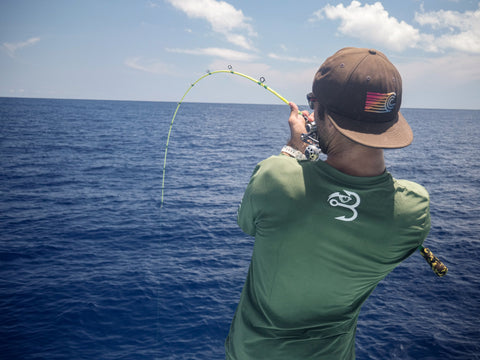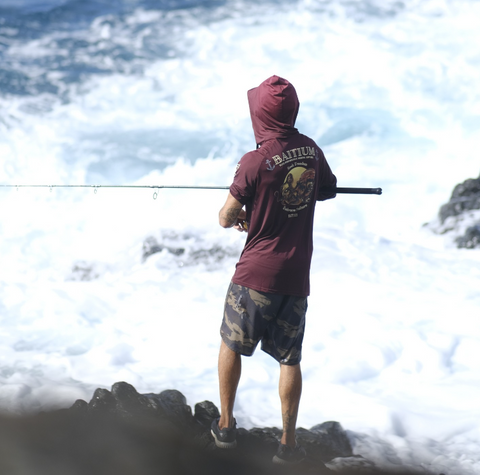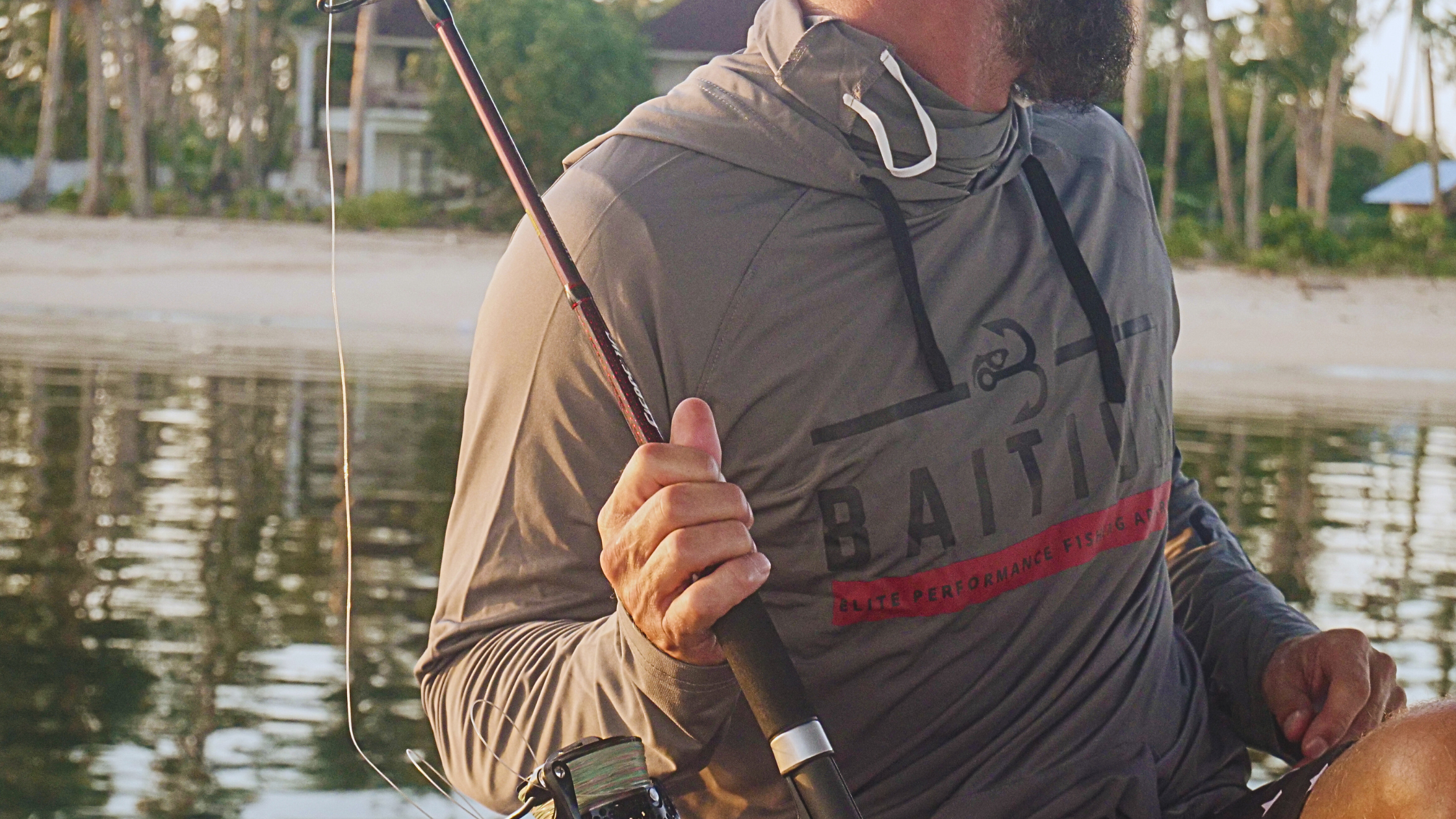Table of Contents
- 4 Reasons to Aim For The Lunkers
- A Guide To Catching Bigger Fish
- Gear Up Right: Choosing the Correct Equipment for Bigger Catches
- The Right Rods
- The Right Bait or Lure
- Enhance your Bait or Lure Presentation
- Know Where and When To Find Bigger Fish
- Follow Fishing Size Regulations
- How To Land Big Fish
- Conclusion
I think we can agree that in the world of angling, sometimes size does matter, especially when it comes to our fish. No, we're not here to settle for ordinary catches. We want the ones that make our hearts race, that make our rods bend like never before. We crave those lunkers, the ones that give us a fight to remember and stories to share for years to come.
Ever heard a fishing buddy say, "Man, I wish that fish was smaller?" Me neither.
So, let's jump into the question we all have: How can I catch bigger fish? We'll explore everything from choosing the right gear and tackle, to finding the hotspots where the big fish hang out, and even what to do when you've got a real heavyweight on your line.

Are there any secrets to catching bigger fish?
4 Reasons to Aim For The Lunkers
But first, let’s talk a bit about our reasons why we aim for the big ones.
For starters, the adrenaline rush of battling a hefty fish is unparalleled. The tug on your line and the strain in your arms as you wrestle with a powerful opponent is an experience that can truly make you feel alive.
Second, there's no denying the bragging rights that come with landing a trophy-sized catch. Posting a picture of that big fish on social media or showing it off at your local angler's club can earn you respect and admiration among your peers. After all, it's a tangible proof of your skill and patience.
Participating in fishing tournaments can also offer bigger rewards—quite literally—for those who catch the largest fish. Who wouldn't want a shot at a massive cash prize, a fancy trophy, or even simply the recognition of being a tournament winner.
Finally, going after larger fish means upping your game, enhancing your expertise, and adopting a more nuanced understanding of the sport. It's not just about throwing your line into the water and hoping for the best. Rather, it's about optimizing your techniques to outsmart those underwater titans.
And yet, even with all this know-how, part of the magic of fishing is the element of chance. There's nothing quite as humbling—and thrilling—as watching a rookie, still trying to perfect their casting technique, reel in a beast of a catch while the old pros walk away skunked. It’s a reminder that despite all the tactics and strategies we employ, nature sometimes has ways of surprising us.

A Guide To Catching Bigger Fish
Here are some pointers and important considerations to help you on your quest to catch those fishy beasts.
Need a UPF shirt for your next outdoor adventure? Check out our recommendations!
Gear Up Right: Choosing the Correct Equipment for Bigger Catches
Selecting the right fishing gear is key when you're setting your sights on bigger fish. To handle the immense strain, we need stronger rods, sturdier reels, and more durable lines. These larger fish can put up quite a fight, and we need equipment that can match their strength and size.
The Right Rods
When it comes to rods, the rule of thumb is that heavier usually means stronger. But it's not just about heft—always check the weight specifications on your gear to ensure it's fit for the big ones you're after.
Remember our previous chat about the significance of rod size in fishing? Here's a refresher: short rods pack more power and are a fantastic choice when you're planning to tangle with larger fish. On the other hand, longer rods are excellent at casting further distances, which can be beneficial in certain fishing situations.
And let's not forget about the action of the rod, which refers to how much it bends when you're reeling in a fish. If you're going after smaller fish, a slow action rod— one that bends more towards the base—could be your best friend. But if it's the big boys you're after, you'll want to reach for a fast action rod. These rods bend more at the tip, allowing you more control and power when wrestling with a huge catch.
The Right Bait or Lure
Choosing the right bait or lure can also make a huge difference when you're hoping to reel in a big catch. The key is knowing what attracts these behemoths and using that knowledge to your advantage.
Big fish are often enticed by the smell and motion of live prey. So if you're using bait, your top choice should be fresh and lively, ideally sourced straight from the waters you're fishing in.
In the realm of lures, it's go big or go home. While small lures can work wonders when you're after smaller fish, aiming for the giants means it's time to upgrade your lure size. The larger lures tend to intimidate the smaller fish and clear the field for the big contenders.

However, it's important to remember that different fish are attracted to different baits and lures. It can be a game of trial and error to find what your specific target fish are interested in.
Enhance your Bait or Lure Presentation
Picking out your gear is only half the battle. How you present it can be just as crucial to increase your chances of reeling in those trophy fish, as Angler Gabe discusses in Bait Presentation 101: How To Make Fish Bite.
Here are some proven strategies to improve your bait or lure presentation.
The Slow and Steady Approach
In the world of fishing, rushing often leads to missed opportunities. Start with a leisurely retrieval speed when presenting your lure or bait. If your bait or lure seems too aggressive, big fish can easily get scared off. Approach your fishing spot gently and patiently. If your calm demeanor doesn't stimulate any activity, you can gradually pick up your speed.
Trolling
Trolling is an effective fishing technique that should be in your playbook if you want to catch some of the larger, more elusive species.
It’s basically a simple but effective method where you drag one or more fishing lines with lures or bait fish through the water. This can be done from a moving boat, or if you're fishing from a stationary spot, by gradually reeling in the line.
The cool thing about trolling is how versatile it is. You can use it to target a wide range of fish. If you're fishing in open water, you can land beauties like salmon, mackerel, and kingfish. If you're out in the deep sea, you can use trolling to hook massive tuna and marlin.
If you're more into inshore fishing, trolling works great for species like bluefish, kingfish, and a variety of jacks. And for the freshwater folks? Well, you can troll your way around lakes and reservoirs to catch salmon and trout.
Wait For It
One of the cardinal rules of fishing is patience. If you believe a big fish has bitten your bait, don't rush to set the hook. A hasty reaction could result in yanking the lure straight out of the fish's mouth. Instead, give the fish a moment to take in the lure properly. Only apply pressure to set the hook when you're sure the fish has taken the bait fully.
Know Where and When To Find Bigger Fish
One crucial part of the puzzle in catching bigger fish is knowing where the aquatic heavyweights like to hang out.
Many larger fish tend to favor the depths, where cooler temperatures and abundant food is available. Tools such as a depth finder or sonar can be really handy in pinpointing these hotspots.
Moreover, areas where the water depth shifts suddenly, known as drop-offs, can serve as prime locations for larger fish. Similarly, they can tend to favor areas rich in underwater structures like rocks, logs, or weed beds. We’ve talked more about this in a previous post called Fishing Near Me: How To Discover and Navigate The Perfect Local Fishing Spots.
If you're on a mission to catch a specific species, one smart strategy is to do your homework and tap into local tournament records. They records hold a wealth of data about the biggest catches, including the species, size, and often where and when the fish were caught. For instance, if you find that a local angler keeps winning bass fishing tournaments using certain lures at specific times of day, you might want to emulate this strategy.
Of course, it's not all about location; timing is equally critical. Knowing when your target fish likes to feed can prove fruitful because then you can align your fishing schedule to their active hours.
Don't hesitate to switch up your usual spots if they're not producing results. Exploring new areas can open up fresh opportunities.

Follow Fishing Size Regulations
When aiming for bigger fish, it’s super important to stay informed and abide by local fishing regulations concerning fish size, not just to stay within the bounds of the rules but also to protect fish populations.
Your local state or provincial fishing authorities are great resources if you’re looking for this information. Their websites or published guidelines typically offer detailed information about regulations, which often include size limits for different fish species. Always make sure you're using the newest and most accurate information from trusted sources.
Learn more about How To Be A Responsible Angler in this post.
How To Land Big Fish
To land a larger fish successfully, there's a certain technique and finesse involved, backed by a composed and strategic mindset.
Begin by raising the fish's head slowly, preferably when it's in line or slightly upstream from you. A gentle, steady upward motion of your rod can exhaust the fish and make it more manageable to reel in. Remember, staying calm is crucial. Avoid sudden jerks or rapid reeling that might cause the fish to get away.
Being aware of your surroundings is key to avoiding potential obstacles that might facilitate the fish's escape. Maintain a tight line and use your rod to control the fish's movements effectively. Leverage side pressure and rod angles to tire the fish out and prevent it from entangling in underwater obstructions. By keeping the line tight and letting the fish pull against the drag, you'll exhaust it over time, making it easier to reel in.
It's essential to remain focused and composed. Panicking can lead to lost focus and potential errors. Using a net can ease the landing process, especially when dealing with larger fish. Ensure the net is sufficiently large for your catch and, if possible, have a fishing buddy help you in the process.
If you practice catch and release fishing, don’t miss our tips to reduce the risk of hurting the fish.
Conclusion
Reeling in the big ones is an art, a science, and a test of wits. Only those anglers willing to sharpen their skills, spruce up their strategies, and understand the finer points of the game get the bragging rights to those whoppers. Our advice: let’s boost our chances the best we can, from picking out the best gear and bait, figuring out where the big fish like to chill, and knowing what to do when we hook a whopper. That way, when luck strikes, we’re ready for that trophy catch.
Don't miss our other posts: How Does Climate Change Affect Fishing? And, Minnow Traps Made Easy: Effortlessly Trap Live Bait For Fishing.
And check out the anglers who love Baitium!
MOST READ NEWS:
How To Use Your Fishing Records to Catch More Fish
Track your fishing trips, analyze patterns, and refine your techniques with a fishing log to catch more fish on every outing!
Solo Fishing Safety Tips: Stay Safe and Enjoy the Outdoors
Learn essential solo fishing safety tips: gear checklist, boat safety, emergency preparedness, weather monitoring & fishing location scouting. Stay safe on the water.
Secrets to Winter Fly Fishing Success
Master winter fly fishing with expert tips on trout behavior, essential gear, and proven techniques. Learn the secrets to catching more fish in cold weather.
How Cold Water Changes Fish Behavior: Insights for Anglers
Explore how cold water affects fish behavior and fishing techniques, enhancing your angling success and strategy.
Is Tech Making Fishing Too Easy? Exploring Forward-Facing Sonar (FFS)
Learn about forward facing sonar in fishing - what it is, how it works, rules for tournaments, ethics, and tips for finding fish with this game-changing technology.
Plan Your Best Fishing Trip Yet this 2025: A Complete Guide
Plan your fishing trip this off-season. Learn to choose destinations, prep gear, pick bait, and trust Baitium for expert tools and tips!
15 Fishing Resolutions for 2025: Set Yourself Up for Success
Discover 15 essential fishing resolutions for 2025: tackle organization, gear maintenance, angling techniques, conservation tips, tournament prep, and fishing safety guidelines.


